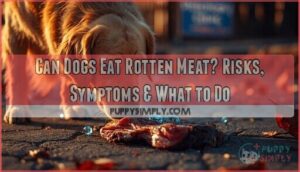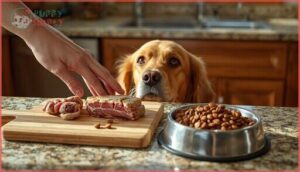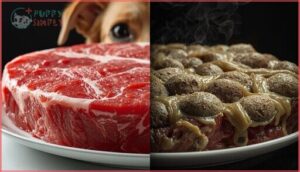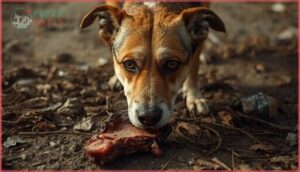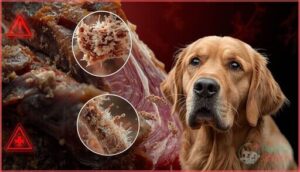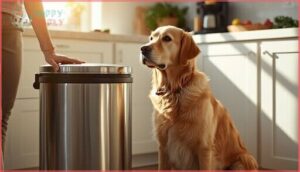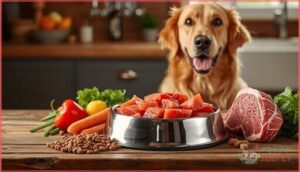This site is supported by our readers. We may earn a commission, at no cost to you, if you purchase through links.
Your dog’s nose leads them to all sorts of treasures—some delightful, others decidedly dangerous. That half-eaten burger decomposing behind the garage or the mystery meat discovered during a neighborhood walk might trigger their scavenging instincts, but rotten meat carries serious health consequences that many pet owners underestimate.
While dogs descended from wolves who ate carrion, domestication altered their digestive resilience, leaving modern canines vulnerable to bacterial toxins like Salmonella and E. coli that thrive in spoiled protein.
The risks extend beyond temporary stomach upset—contaminated meat can trigger severe gastroenteritis, liver damage, and neurological complications requiring emergency veterinary intervention. Understanding what qualifies as rotten, recognizing poisoning symptoms early, and knowing exactly how to respond can mean the difference between a close call and a critical health crisis.
Table Of Contents
- Key Takeaways
- Can Dogs Eat Rotten Meat?
- What Qualifies as Rotten Meat for Dogs?
- Why Are Dogs Attracted to Rotten Meat?
- What Happens if a Dog Eats Rotten Meat?
- What Are The Risks of Rotten Meat Consumption?
- What Symptoms Indicate Rotten Meat Poisoning?
- What Should I Do if My Dog Eats Rotten Meat?
- How Can I Prevent My Dog Eating Rotten Meat?
- Are There Safe Alternatives to Rotten Meat?
- Frequently Asked Questions (FAQs)
- Can rotten meat make a dog sick?
- How are dogs able to eat rotten meat?
- Can animals eat spoiled meat?
- What happens if a dog eats rotten meat?
- Can dogs eat meat that has gone bad?
- Can dogs get sick from eating spoiled food?
- Are certain breeds more resistant to food poisoning than others?
- Are there any home remedies for treating food poisoning in dogs?
- Can dogs digest rotten meat better than humans?
- How long does rotten meat poisoning last?
- Conclusion
Key Takeaways
- Rotten meat poses serious health risks to dogs despite their scavenging ancestry, as modern canines lack the digestive resilience to safely handle bacterial toxins like Salmonella, E. coli, and mycotoxins that can cause severe gastroenteritis, liver damage, and neurological complications.
- Dogs are instinctively attracted to spoiled meat due to evolutionary scavenging behaviors and powerful olfactory receptors that detect decomposing food at concentrations millions of times lower than humans can perceive, making prevention through secure storage and training essential.
- Symptoms of rotten meat poisoning typically appear within 6-24 hours and include vomiting, bloody diarrhea, abdominal pain, lethargy, and loss of appetite—requiring immediate veterinary attention if symptoms persist beyond 24 hours or include bloody stool, pale gums, or seizures.
- Prevention strategies include proper food storage at or below 40°F, securing trash bins with commercial-grade lids, removing outdoor hazards like fallen fruit or carcasses, and training dogs with “leave it” commands reinforced through positive reward systems.
Can Dogs Eat Rotten Meat?
No, your dog shouldn’t eat rotten meat—it poses serious canine health risks. While the canine digestive system evolved to handle some bacterial contamination, spoiled meat harbors dangerous levels of toxins and pathogens that overwhelm even strong immunity.
Similarly, feeding your dog safe shellfish like lobster requires removing hard shells that can cause digestive blockages, just as you’d avoid spoiled proteins altogether.
Rotten meat dangers include food poisoning from Salmonella, E. coli, and mycotoxins that attack your dog’s liver and nervous system. Pet food safety isn’t just about freshness; bacterial contamination in decomposed protein can trigger severe gastroenteritis, dehydration, and life-threatening infections.
For more information about botulism symptoms in dogs, immediate veterinary attention is vital if your pet shows signs of illness. Following animal wellness tips means keeping all spoiled food away from your companion.
What Qualifies as Rotten Meat for Dogs?
Not all spoiled meat looks or smells the same, and knowing what crosses the line from fresh to hazardous helps you protect your dog. Rotten meat isn’t just about appearance—it involves bacterial growth, chemical changes, and toxic byproducts that develop as decomposition progresses.
Understanding the key indicators of spoilage, the specific dangers lurking in contaminated meat, and how it differs from safe protein sources will help you make informed decisions about what’s truly dangerous for your pet.
Signs of Spoiled Meat
Your senses are your best defense when identifying spoiled food that could lead to food poisoning. Watch for these visual cues, odor changes, and texture signs:
- Color shifts – Fresh meat appears bright red or pink, while rotten meat shows dull gray-brown hues or greenish patches, indicating bacterial contamination.
- Sour or ammonia-like smells – Spoiled food emits fetid odors from toxins.
- Slimy surface – Tacky coating signals mold growth, and storage signals danger.
It’s also important to understand that spoilage bacteria concerns mean even properly refrigerated meat can still go bad.
Bacteria and Toxins in Rotten Meat
Once spoilage bacteria take hold, Salmonella, E. coli, and Staphylococcus aureus colonize the meat and release toxins that cooking can’t always neutralize. For instance, Staphylococcus produces heat-stable enterotoxins that trigger food poisoning even after heating.
Meanwhile, molds generate mycotoxins—compounds that damage your dog’s liver and gut health—creating dangers that persist long after bacteria die.
Differences From Fresh or Cooked Meat
Fresh meat maintains firm texture and mild odor, while rotten meat develops a slimy surface coating, sour ammonia smell, and patchy discoloration—clear visual decay you can spot across the kitchen.
Cooking kills surface bacteria but won’t eliminate heat-stable toxins or mycotoxins already present. That nutritional shift matters to your dog’s gastrointestinal health: spoiled proteins lose quality and invite bacterial contamination that fresh cuts simply don’t carry.
Why Are Dogs Attracted to Rotten Meat?
If you’ve ever caught your dog sniffing around the trash or showing unusual interest in something decidedly past its prime, you’re not imagining things. Dogs are genuinely drawn to rotten meat, and it’s not just bad judgment on their part.
This attraction stems from two main factors: their evolutionary background as scavengers and the specific sensory cues that decaying meat produces.
Evolutionary Scavenging Instincts
Your dog’s attraction to rotten meat isn’t a quirk—it’s written into their DNA. Scavenging behavior traces back to canine ancestors who survived by exploiting wild food sources when hunting failed.
Your dog’s craving for rotten meat is evolutionary DNA from scavenging ancestors who survived by exploiting wild food sources when hunting failed
These evolutionary adaptations gave wolves and early dogs a competitive edge, allowing them to extract nutrients from carrion that other animals avoided. Natural selection favored individuals with stronger digestive systems capable of handling this primitive diet.
Today’s domesticated canine still carries these instincts, drawn to decomposing matter through ancient survival programming that once meant the difference between starvation and survival in harsh environments.
Sensory Triggers for Dogs
Powerful olfactory receptors drive your dog straight toward decomposing food—they detect scents at concentrations millions of times lower than you can perceive. This outstanding smell sensitivity explains why canine noses zero in on garbage bins and roadside carrion during walks.
Choosing puppy food for large breed puppies with balanced nutrition helps channel that powerful nose toward healthy meals instead of scavenged scraps.
Multiple sensory channels reinforce this attraction:
- Hearing range picks up flies buzzing around spoiled meat from surprising distances
- Visual cues like movement or texture changes signal potential food sources
- Gustatory preferences reward scavenging with rich, savory flavors dogs instinctively crave
These animal instincts work together, creating irresistible animal behavior patterns rooted in survival programming.
What Happens if a Dog Eats Rotten Meat?
When your dog gets into rotten meat, the consequences can range from mild stomach upset to serious medical emergencies.
The severity depends on factors like the type and amount of bacteria present, how much your dog consumed, and their overall health status.
Understanding what happens in your dog’s body—both immediately and over time—helps you recognize warning signs and respond appropriately.
Immediate Physical Reactions
Within minutes of swallowing rotten meat, your dog’s body launches an adrenaline rush—a rapid nerve activation response to potential danger. Heart rate jumps to 120–160 beats per minute, pupils dilate, and breathing quickens by 20 to 40 percent as muscles prepare for physiological stress.
This toxic shock from bacterial contamination and toxins triggers trembling, cold paws, and excess drooling. The digestive response follows quickly: vomiting often starts within one to six hours, clearing harmful contents, while abdominal cramping and restlessness signal your dog’s gut is fighting back against food poisoning.
Short-Term and Long-Term Health Effects
Your dog’s digestive system bears the brunt immediately after toxin exposure from rotten meat. Vomiting and diarrhea usually hit within 6 to 24 hours, triggering an immune response as white blood cells surge to fight invading bacteria.
Gut inflammation develops quickly, damaging the intestinal lining and raising food poisoning risks. Chronic dehydration from fluid loss stresses kidneys and heart, while the liver works overtime to filter toxins.
Over time, repeated exposure can cause lasting organ damage, disrupt gut microbiota, and weaken your dog’s ability to handle future digestive challenges.
What Are The Risks of Rotten Meat Consumption?
When your dog consumes rotten meat, you’re not just dealing with a simple upset stomach—the health risks can range from acute infections to long-term organ damage.
The specific dangers depend on what’s growing in that spoiled food, whether it’s bacteria multiplying in the flesh or toxic mold spreading across the surface. Let’s break down the three primary categories of risk you need to understand.
Bacterial Infections (Salmonella, E. Coli)
Rotten meat teems with Salmonella and pathogenic E. coli, two bacteria that can wreak havoc on your dog’s digestive system. These bacterial infections trigger severe gastroenteritis within hours, causing vomiting, bloody diarrhea, and dehydration.
The zoonotic diseases risk extends to your household—you can contract these pathogens through handling contaminated surfaces. Bacterial resistance complicates treatment, making veterinary care essential for gut health restoration and food safety protocols critical for prevention.
Mycotoxins and Mold Exposure
Beyond bacteria, mycotoxins—toxic substances produced by mold on rotten meat—pose severe threats to your dog’s liver and nervous system. Fungal growth accelerates in warm, humid conditions, contaminating indoor air and surfaces.
Consider these key risks:
- Aflatoxins cause liver damage and potential failure
- Tremorgenic toxins trigger seizures and tremors
- Ochratoxins damage kidneys over time
- Patulin from spoiled food induces vomiting
- Mycotoxin testing requires specialized veterinary diagnostics
Mold prevention and toxin removal demand immediate veterinary intervention when exposure occurs.
Foodborne Illness and Poisoning
When bacterial toxins and mycotoxins combine, foodborne illnesses in dogs mirror human food poisoning but often progress faster. Salmonella and E coli contamination causes severe gastrointestinal health crises requiring immediate veterinary care.
| Pathogen Type | Common Source |
|---|---|
| Salmonella | Contaminated poultry, eggs |
| E. coli | Spoiled ground meat |
| Clostridium | Improperly stored meat |
| Listeria | Contaminated dairy, meat |
Pet nutrition depends on food safety—don’t gamble with your dog’s wellbeing.
What Symptoms Indicate Rotten Meat Poisoning?
Recognizing the signs of foodborne illness early can make all the difference in getting your dog the care they need.
The symptoms of rotten meat poisoning usually appear within hours of consumption, though some may develop more gradually over the following day or two. Watch for these telltale indicators that your dog’s system is struggling to cope with bacterial contamination or toxins.
Vomiting and Diarrhea
When your dog ingests spoiled meat, vomiting and diarrhea usually appear within 6 to 12 hours as the canine digestive system attempts to expel harmful bacteria and toxins. These gastrointestinal issues signal food poisoning and indicate a gut infection that disrupts normal digestive health through severe stomach upset.
Watch for these signs of gastrointestinal health breakdown:
- Repeated vomiting episodes with undigested food or yellow bile
- Watery or bloody diarrhea with an unusually foul odor
- Straining or urgency when attempting to defecate
- Retching sounds even when your dog’s stomach appears empty
- Visible distress or whining before or after elimination
Abdominal Pain and Swelling
Along with vomiting and diarrhea, you’ll notice abdominal pain through whining, restlessness, or a hunched posture that signals digestive issues within your dog’s gastrointestinal system.
The inflammatory response from food poisoning often causes abdominal tenderness, and your dog may flinch when you gently touch the belly. Severe cases can produce visible swelling from gas buildup or even stomach ulcers that threaten canine digestive health.
Lethargy and Loss of Appetite
When food poisoning strikes your dog’s canine digestive system, lethargy and loss of appetite often follow the initial gastrointestinal issues. You’ll see your dog refusing meals, sleeping excessively, and showing little interest in normal activities—clear signs that toxic bacteria are affecting overall gastrointestinal health in dogs.
These appetite disorders warrant immediate veterinary guidance and careful health monitoring.
What Should I Do if My Dog Eats Rotten Meat?
If your dog has eaten rotten meat, staying calm and acting quickly can make all the difference in preventing serious illness.
Your response depends on how much they ate, when it happened, and whether symptoms have already started. Here’s what you need to know to assess the situation, decide if veterinary care is necessary, and provide appropriate first aid at home.
Assessing The Situation
The moment you suspect your dog ate rotten meat, immediate Risk Assessment is vital. First, evaluate the Spoilage Detection indicators: check the meat’s odor, color, and texture to gauge contamination level.
Next, monitor your dog’s Canine Behavior—note energy shifts, appetite changes, or distress signals within the first hour. Document when ingestion occurred, as timing guides Emergency Response decisions for potential food poisoning intervention.
When to Contact a Veterinarian
Recognizing Urgent Care Signs can save your dog’s life. Contact your veterinarian immediately if you observe:
- Persistent vomiting or diarrhea lasting more than 24 hours, indicating severe food poisoning or toxic substances affecting the gastrointestinal tract
- Bloody stool or vomit, pale gums, or rapid breathing—red flags for Vet Emergency situations
- Severe abdominal pain, collapse, or seizures requiring immediate veterinary medicine intervention for Pet Poisoning or canine health issues
At-Home First Aid Measures
While waiting for veterinary guidance, you can take measured steps at home. Monitor your dog closely for vomiting or diarrhea, offering small amounts of water to prevent dehydration but avoid food for 12-24 hours.
| First Aid Action | When to Apply | Important Notes |
|---|---|---|
| Wound Cleaning | If cuts occur from sharp bones | Use mild soap and water for 5 minutes |
| Hydration monitoring | After vomiting episodes | Offer water in small sips every 15 minutes |
| Poison Control contact | Severe symptoms appear | Keep vet numbers accessible for Emergency Response |
Keep your Pet First Aid kit ready and never induce vomiting without professional instruction, as this can worsen gastrointestinal health in dogs experiencing food poisoning.
How Can I Prevent My Dog Eating Rotten Meat?
Preventing your dog from eating rotten meat requires a proactive approach that concerns both your home environment and your dog’s behavior. The key lies in eliminating access to spoiled food while teaching your dog to resist the temptation when they encounter it.
Let’s explore three essential strategies that will help keep your dog safe from the dangers of rotten meat.
Safe Food Storage Practices
You can’t always prevent your dog from encountering rotten food in the wild, but you can certainly control what happens at home. Proper Handling Techniques and Storage Containers form your first line of defense against food poisoning.
- Keep refrigerated items at or below 40°F (4°C) to slow bacterial growth
- Store raw meat on the bottom shelf in airtight containers to prevent cross-contamination
- Label leftovers with dates and practice Shelf Life Management using first-in, first-out rotation
- Freeze foods at 0°F (-18°C) or lower to halt decomposing food processes
- Clean food bowls daily and monitor pantry items for signs of spoiled food
Securing Trash and Outdoor Hazards
Beyond your kitchen, outdoor spaces and trash bins demand equal vigilance for food safety and pet safety. Unsecured containers are like open invitations for scavenging dogs drawn to decomposing food and toxic substances.
| Trash Can Safety | Implementation |
|---|---|
| Commercially rated lids | Sensor or stepped closures seal automatically |
| Stable placement | 4-6 feet clearance from doors reduces access |
| Outdoor Hazard clearing | Remove fallen fruit and carcasses promptly |
| Pest Control barriers | Install fencing around dumpsters |
| Waste Management rotation | Schedule regular pickup to prevent overflow |
Secure Fencing and weatherproof enclosures shield bins from determined noses while maintaining proper hygiene around your property.
Training Dogs to Avoid Spoiled Food
Teaching your dog to ignore rotten food starts with positive reinforcement and consistent canine obedience drills.
Use leash training during walks to guide your dog past spoiled items, rewarding calm behavior immediately with high-value treats.
Food aversion techniques paired with a reliable “leave it” command strengthen impulse control, while reward systems help your canine associate ignoring temptation with something far better.
Are There Safe Alternatives to Rotten Meat?
Keeping your dog away from rotten meat doesn’t mean compromising on taste or nutrition. There are plenty of safe, healthy alternatives that satisfy their carnivorous cravings without the dangerous bacterial load.
Let’s look at the best protein sources, quality food options, and fresh snacks you can confidently offer your dog.
Recommended Treats and Proteins
You can replace rotten meat temptations with safe, protein-rich alternatives that support canine nutrition and pet wellness.
Real chicken breast slices, turkey jerky treats with 25 to 35 percent protein, and lean beef options deliver complete protein sources without bacterial risks.
Fish-based snacks like salmon bites provide omega-3 fatty acids alongside quality protein, making them excellent healthy snacks for your dog’s diet.
Choosing High-Quality Dog Foods
When selecting commercial foods, prioritize formulas with named animal proteins—like chicken or salmon—listed first, ensuring proper nutrient balance for canine nutrition. Look for AAFCO statements confirming complete dog nutrition, and check for ingredient sourcing transparency to minimize food allergies.
Quality brands support digestive health through whole-food ingredients and natural preservatives, giving your dog ideal pet nutrition without contamination risks.
Offering Fresh, Nutritious Snacks
Beyond commercial options, you can offer fresh, whole foods like plain yogurt with berries or sliced apple with peanut butter—both deliver nutrient balance and healthy treats without spoilage risks.
Carrot sticks paired with lean chicken provide canine nutrition through natural vitamins and protein. Practice snack portioning to maintain dog health and nutrition, keeping fresh food options refrigerated and discarding anything that smells off.
Frequently Asked Questions (FAQs)
Can rotten meat make a dog sick?
Yes, rotten meat can make your dog very sick.
Food poisoning from toxic substances like bacteria causes severe gastrointestinal health problems, including vomiting and diarrhea that threaten your dog’s canine digestive system.
How are dogs able to eat rotten meat?
Dogs possess powerful digestive adaptations including highly acidic stomachs (pH 1-2), fast gut transit, strong immune systems, and beneficial gut microbiomes that help their canine digestive systems tolerate bacteria better than humans can.
Can animals eat spoiled meat?
Like nature’s cleanup crew, many scavenger animals possess digestive enzymes and a resilient gut microbiome that handle spoiled meat better than dogs, though food poisoning and gastrointestinal upset still pose risks requiring veterinary attention.
What happens if a dog eats rotten meat?
When your canine ingests rotten meat, bacterial overload strikes the digestive system rapidly, triggering food poisoning within hours.
Toxicity levels spike as harmful bacteria overwhelm the gut microbiome, causing gut damage and requiring careful canine recovery.
Can dogs eat meat that has gone bad?
Spoiled protein is a ticking time bomb for your dog’s gastrointestinal health.
Meat spoilage signs like foul odor or slimy texture indicate harmful bacteria that trigger food poisoning, regardless of cooking—toxicity prevention starts with proper pet food safety practices.
Can dogs get sick from eating spoiled food?
Yes, your canine can develop food poisoning from spoiled items.
Bacteria in rotten food can cause severe digestive issues, including vomiting and diarrhea, that compromise gut microbiome balance and overall digestive system function.
Are certain breeds more resistant to food poisoning than others?
An ounce of prevention is worth a pound of cure. While some large working breeds show stronger gut microbiota and immune alertness, no canine breed enjoys true genetic predisposition against food poisoning from spoiled meat.
Are there any home remedies for treating food poisoning in dogs?
While mild food poisoning may improve with fasting therapy, bland diets, and hydration methods, home remedies aren’t substitutes for veterinary care when vomiting, diarrhea, or other gastrointestinal symptoms persist or worsen.
Can dogs digest rotten meat better than humans?
While your canine companion isn’t a garbage disposal, dogs do possess remarkably acidic stomachs (pH 1–2) and faster gut transit that help their digestive system handle bacteria better than humans, though rotten meat still poses serious immune system risks.
How long does rotten meat poisoning last?
Food poisoning from rotten meat usually lasts 24 to 72 hours in dogs, though severe cases involving dehydration effects or toxic substances can extend recovery timeframe to a week or longer depending on toxicity levels.
Conclusion
An ounce of prevention truly outweighs a pound of cure when protecting your dog from spoiled food hazards. While their ancestral instincts draw them to decomposing finds, the question “can dogs eat rotten meat” has a clear answer: the bacterial toxins and mycotoxins pose serious, sometimes fatal, risks that modern canine digestive systems can’t safely handle.
Vigilant food storage, prompt trash disposal, and recognizing early poisoning symptoms empower you to safeguard your dog’s health before scavenging instincts create emergencies.

